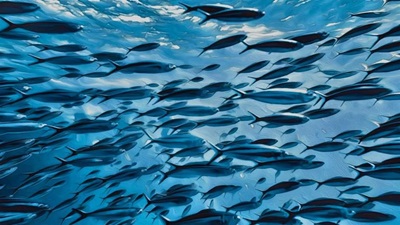Overview
The global ocean teems with life, and it contributes to the vital cycles that keep people and our planet healthy. But the seas are vulnerable to overfishing, loss of habitat such as seagrasses and mangroves, ineffective fisheries management, plastic pollution, and declining biodiversity. These mounting losses affect the coastal communities that depend on the ocean for food and jobs.
Pew’s ocean work supports efforts to build collaborative governance systems to guide activities like fishing, pollution, and conservation, and to create protected areas that maintain and restore the health of marine ecosystems. These activities not only support nature, they also benefit the people who rely on marine resources for their livelihoods.

Overfishing and illegal, unreported and unregulated (IUU) fishing not only strain fish populations around the world, but also threaten the food security and economic livelihoods of hundreds of millions of people.

Over decades of international negotiation, the nations of the world have committed to the sustainable management of fisheries and protection of marine ecosystems. Multiple treaties and conventions require fishery managers to account for the impact of fishing activity on the health of the entire ecosystem, not just targeted fish stocks.

On 15 September 2025, a World Trade Organization (WTO) agreement to help end harmful fisheries subsidies entered into force, giving governments around the world a significant new tool in the effort to stem overfishing and illegal fishing. The historic agreement, which the WTO adopted in June 2022, will tackle one of the key drivers of overfishing by curtailing harmful subsidies – payments made by nations to commercial fishing operators to keep those businesses profitable.

The ocean is crucial for keeping the planet healthy, yet it’s under strain from damaging activities and climate change.

The ocean’s coral reefs support an estimated 25% of all known marine life yet are threatened by rising ocean temperatures and bleaching. In this “After the Fact” episode from our recurring “From Lab to Life” series, we look at ways scientists are pioneering efforts to save corals.
Our Work

Good health is important to everyone. Pew conducts research and provides information and fact-based recommendations to state agencies, hospitals, researchers, and other health partners to help them provide better care. We find and share evidence-based practices to improve Americans’ health and well-being, including services that can prevent suicide, improve mental health care, and treat substance use disorder.
Latest In Advance Health & Well-Being

Communities throughout the country share common needs: affordable connections to broadband Internet, modern and reliable energy infrastructure, effective responses to mental health challenges, and ways to resolve legal disputes more quickly and fairly. To address these issues, Pew collaborates with states and local governments to find and promote evidence-based solutions that help provide stability and opportunity.

Nonpartisan, fact-based improvements in federal policy can create jobs, lower costs, and help the nation prepare for the future. When our research shows that small changes can have a big impact, we work across party lines to improve national challenges like housing affordability, internet access, energy reliability, and health care.
Latest In Improve Federal Policy
/16x9_m.jpg?mw=352&hash=5394D3C3222DC77A0FAB569584F50D98)
Economic opportunity is the foundation of American society. Pew supports national, state, and local efforts to expand opportunity and promote financial well-being. Our work helps people pay off student loans, navigate court proceedings such as debt collection, buy or rent a home, access affordable internet, and save for their retirement.
Latest In Improve Economic Advancement

The global ocean teems with life, and it contributes to the vital cycles that keep people and our planet healthy. But the seas are vulnerable to overfishing, loss of habitat such as seagrasses and mangroves, ineffective fisheries management, plastic pollution, and declining biodiversity. These mounting losses affect the coastal communities that depend on the ocean for food and jobs.
Latest In Protect Marine Life

States and cities are the “laboratories of democracy” in America—the places where lawmakers and governors look for new ways to help their communities succeed. Whether in Pew’s hometown of Philadelphia or any of the 50 state capitals, we help elected leaders respond to the needs of their citizens, use public dollars wisely, fix outdated policies, and build a better future for all.
Latest In Strengthen State Government

Conserving natural spaces conveys benefits far beyond the gains to wildlife and their habitats. As scores of studies show, protecting and restoring lands and waters, particularly when done in close partnership with local communities, also improves people’s lives—and local economies—by increasing tourism and outdoor recreation.
